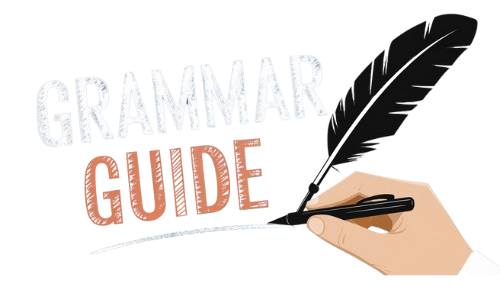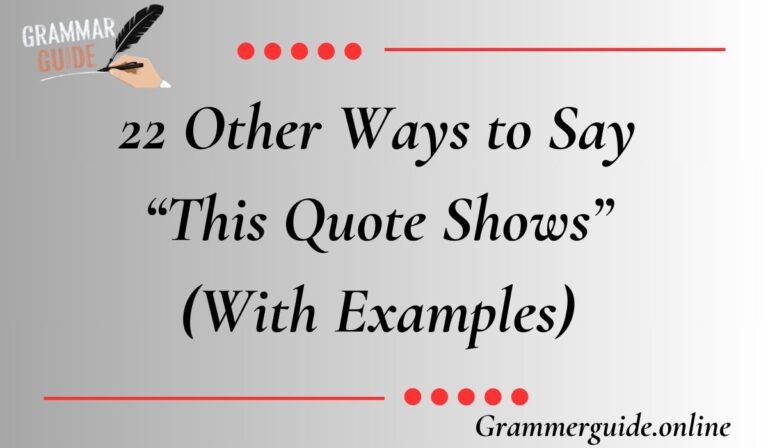Sometimes, using “this quote shows” over and over can make writing feel dull and repetitive. To keep your analysis fresh and engaging, it’s helpful to use different phrases. This guide explores 20 alternative ways to introduce and explain quotes effectively.
From “this excerpt demonstrates” to “these words convey,” each option adds variety and clarity. These alternatives make your writing more dynamic, especially in essays and reports.
By using diverse expressions, you can enhance your arguments and keep readers interested. Let’s dive into these powerful replacements with examples!
Key Takeaways
- Using the same phrase repeatedly can make writing dull, so it’s important to vary your wording.
- There are 20 alternative ways to say “this quote shows,” each adding clarity and depth.
- Examples include “this excerpt demonstrates,” “these words convey,” and “the passage reveals.”
- These alternatives improve writing by making analysis more engaging and precise.
- They are useful in essays, reports, and academic writing to keep readers interested.
- Incorporating different phrases enhances your ability to explain and support ideas effectively.
What To Say Instead of “This Quote Shows”
Using the same phrase repeatedly can make writing dull and repetitive. Instead of constantly saying “this quote shows,” you can use a variety of alternatives to enhance clarity and engagement.
Different phrases like “this quotation illustrates” or “this passage reveals” help convey specific meanings, making your analysis more precise and impactful.
Choosing the right alternative depends on the context. For example, “this excerpt exemplifies” works well when showcasing a key idea, while “these words underscore” adds emphasis to an argument.
1. This Quotation Illustrates
Using “this quotation illustrates” helps clarify a concept by making it more understandable. It is useful when a quote serves as a vivid example of an idea or argument. This phrase is great for academic writing, where clear explanations are necessary.
Example:
“Hardships often prepare ordinary people for an extraordinary destiny.” This quotation illustrates how struggles can lead to great success.
Short Letter:
Dear Student,
Using “this quotation illustrates” in your essays will make your arguments more convincing. This phrase helps present quotes as strong examples that clarify your points. Keep practicing, and your writing will improve significantly.
Best,
Your Teacher
2. This Excerpt Demonstrates
“This excerpt demonstrates” highlights how a specific part of the text proves or explains a broader idea. This phrase is ideal for academic essays that require in-depth analysis of literature or speeches.
Example:
“Every small kindness creates a ripple.” This excerpt demonstrates that even minor acts of kindness can have far-reaching effects.
Short Letter:
Dear Student,
When writing essays, consider using “this excerpt demonstrates” to show how a passage supports your argument. This will add depth to your analysis. Keep up the good work!
Best,
Your Teacher
3. The Passage Reveals
This phrase is effective when discussing quotes that uncover deeper meanings or hidden truths. It is useful for analyzing literature, philosophical texts, or speeches.
Example:
“To forgive is to set a prisoner free and discover the prisoner was you.” The passage reveals that forgiveness benefits the forgiver as much as the forgiven.
Short Letter:
Dear Student,
Remember to use “the passage reveals” when discussing deeper meanings in literature. This phrase will enhance your literary analysis skills.
Best,
Your Teacher
4. This Citation Highlights
Using “this citation highlights” draws attention to key elements within a quote. It is particularly useful in academic and report writing.
Example:
“Life is what happens when you’re busy making other plans.” This citation highlights the unpredictability of life and the need to live in the moment.
Short Letter:
Dear Student,
Using “this citation highlights” will help emphasize key ideas in your writing. Keep applying it in your essays for stronger arguments.
Best,
Your Teacher
5. These Words Underscore
This phrase is perfect for emphasizing a quote’s importance. It strengthens your argument by showing that the quote is a crucial piece of evidence.
Example:
“In the end, we will remember not the words of our enemies, but the silence of our friends.” These words underscore the importance of standing up for justice.
Short Letter:
Dear Student,
Try using “these words underscore” in your essays to highlight important ideas. It will make your analysis more impactful.
Best,
Your Teacher
6. This Statement Evidences
This phrase is used when a quote provides undeniable proof of an argument or claim.
Example:
“The greatest glory in living lies not in never falling, but in rising every time we fall.” This statement evidences the power of resilience.
Short Letter:
Dear Student,
Using “this statement evidence” will strengthen your arguments. Keep practicing, and your writing will become more persuasive.
Best,
Your Teacher
7. This Excerpt Exemplifies
This phrase is useful when a quote perfectly represents a theme or concept.
Example:
“Be the change that you wish to see in the world.” This excerpt exemplifies the idea that personal action leads to societal change.
Short Letter:
Dear Student,
Use “this excerpt exemplifies” when highlighting key themes in literature. It will make your analysis more effective.
Best,
Your Teacher
8. The Quote Delineates
This phrase helps outline or define an idea clearly.
Example:
“Knowledge is power.” The quote delineates the importance of learning and intellectual growth.
Short Letter:
Dear Student,
Using “the quote delineates” will help clarify complex ideas in your essays. Keep practicing!
Best,
Your Teacher
9. These Lines Indicate
This phrase shows that the quote leads to a specific conclusion or implication.
Example:
“The only thing necessary for the triumph of evil is for good men to do nothing.” These lines indicate that action is crucial in preventing injustice.
Short Letter:
Dear Student,
Try using “these lines indicate” in your analysis. It will make your points clearer.
Best,
Your Teacher
10. This Snippet Reflects
This phrase suggests that a quote mirrors or embodies a broader idea.
Example:
“Life is like riding a bicycle. To keep your balance, you must keep moving.” This snippet reflects the need for perseverance.
Short Letter:
Dear Student,
Use “this snippet reflects” to connect quotes to larger themes. It will enhance your writing.
Best,
Your Teacher
11. This Quotation Represents
A useful phrase for when a quote stands as a symbol of a greater concept.
Example:
“Actions speak louder than words.” This quotation represents the idea that deeds are more important than promises.
Short Letter:
Dear Student,
Using “this quotation represents” will strengthen your essays. Keep improving!
Best,
Your Teacher
12. This Quote Exemplifies
“This quote exemplifies” is used to show that a statement is a perfect representation of an idea, principle, or theme. It helps make connections between the quote and a larger discussion, emphasizing its relevance.
Example:
“Happiness depends upon ourselves.” This quote exemplifies the idea that personal responsibility plays a crucial role in our well-being.
Short Letter:
Dear Student,
Using “this quote exemplifies” in your essays will help make your arguments clearer and stronger. It shows that the quote is not just relevant but is an ideal example of the point you’re making. Keep practicing, and your writing will improve significantly.
Best,
Your Teacher
13. This Quote Affirms
“This quote affirms” is used when a statement supports a belief or confirms a widely accepted truth. It works well in essays that discuss societal norms, ethics, or motivational ideas.
Example:
“Success is not final, failure is not fatal: it is the courage to continue that counts.” This quote affirms that perseverance is more important than temporary victories or setbacks.
Short Letter:
Dear Student,
When writing analytical essays, using “this quote affirms” helps show that a statement reinforces a key point. Keep practicing and incorporating this phrase in your writing for a stronger impact.
Best,
Your Teacher
14. This Quote Conveys
“This quote conveys” is used when a statement expresses a specific emotion, idea, or concept clearly. It is useful in literary and analytical writing.
Example:
“Time is the most valuable thing a man can spend.” This quote conveys the importance of making the most of one’s time.
Short Letter:
Dear Student,
Try using “this quote conveys” when discussing quotes that express important emotions or ideas. This will make your writing more engaging and insightful.
Best,
Your Teacher
15. This Quote Sheds Light On
“This quote sheds light on” is used when a statement clarifies a previously unclear or complex concept. It works well for analytical and persuasive writing.
Example:
“Do what you can, with what you have, where you are.” This quote sheds light on the power of resourcefulness in achieving success.
Short Letter:
Dear Student,
When analyzing quotes, use “this quote sheds light on” to highlight its explanatory power. It helps connect ideas effectively. Keep practicing!
Best,
Your Teacher
16. This Quote Emphasizes
“This quote emphasizes” is used when a statement highlights or reinforces an important point. It is useful in both persuasive and analytical essays.
Example:
“It always seems impossible until it’s done.” This quote emphasizes the power of persistence and determination.
Short Letter:
Dear Student,
Using “this quote emphasizes” helps draw attention to critical points in your writing. Keep incorporating it in your essays to enhance your analysis.
Best,
Your Teacher
17. This Statement Highlights
“This statement highlights” is used to draw attention to a key idea or argument presented in a quote.
Example:
“The only limit to our realization of tomorrow is our doubts of today.” This statement highlights the role of confidence in achieving success.
Short Letter:
Dear Student,
Try using “this statement highlights” in your essays to bring attention to essential ideas. It will make your arguments stronger.
Best,
Your Teacher
18. This Passage Demonstrates
“This passage demonstrates” is useful for showing how a statement exemplifies a larger theme or principle.
Example:
“An eye for an eye will only make the whole world blind.” This passage demonstrates the negative effects of revenge.
Short Letter:
Dear Student,
Use “this passage demonstrates” when analyzing longer quotes. It will help strengthen your literary interpretations.
Best,
Your Teacher
19. These Lines Illustrate
“These lines illustrate” works well for highlighting how a quote supports an argument or theme.
Example:
“We must accept finite disappointment, but never lose infinite hope.” These lines illustrate the power of resilience.
Short Letter:
Dear Student,
Using “these lines illustrate” will help make your analysis more vivid and engaging. Keep practicing!
Best,
Your Teacher
20. This Quote Depicts
“This quote depicts” is useful when describing how a quote paints a clear picture of an idea or situation.
Example:
“Life is like riding a bicycle. To keep your balance, you must keep moving.” This quote depicts the need for constant progress.
Short Letter:
Dear Student,
Using “this quote depicts” allows you to explain how a quote creates a vivid image or scenario. Keep practicing!
Best,
Your Teacher
21. The Passage Explains
“The passage explains” is useful for clarifying complex ideas through a quote.
Example:
“Do not go where the path may lead, go instead where there is no path and leave a trail.” The passage explains the importance of forging one’s own way in life.
Short Letter:
Dear Student,
Use “the passage explains” to show how a quote simplifies a difficult idea. Keep refining your analytical skills!
Best,
Your Teacher
22. These Lines Clarify
“These lines clarify” is helpful when a quote makes a concept more understandable.
Example:
“Don’t count the days; make the days count.” These lines clarify the importance of making meaningful use of time.
Short Letter:
Dear Student,
Try using “these lines clarify” to highlight how a quote helps explain an idea. It will enhance your writing clarity.
Best,
Your Teacher
Frequently Asked Questions
Why should I use alternatives to “this quote shows”?
To make your writing more varied, engaging, and precise.
When should I use “this quotation illustrates”?
When the quote clearly provides a strong example of your point.
How does “these words underscore” differ from “this citation highlights”?
“These words underscore” emphasizes importance, while “this citation highlights” draws attention to a key detail.
Can I use these phrases in formal writing?
Yes, all these alternatives are suitable for academic and professional writing.
What’s the benefit of using “this statement evidence”?
It presents the quote as concrete proof supporting your argument.
Conclusion
Using diverse alternatives to “this quote shows” enhances the clarity, depth, and engagement of your writing. By incorporating phrases like “this quotation illustrates” or “this statement evidence,” you avoid repetition and strengthen your analysis.
These variations help articulate your points effectively, making your essays, reports, and discussions more compelling. Whether in academic or professional writing, mastering these expressions will refine your ability to present and interpret quotations with precision and impact.

Robert is a talented content writer and digital marketer with expertise in SEO, social media management, and online marketing.







